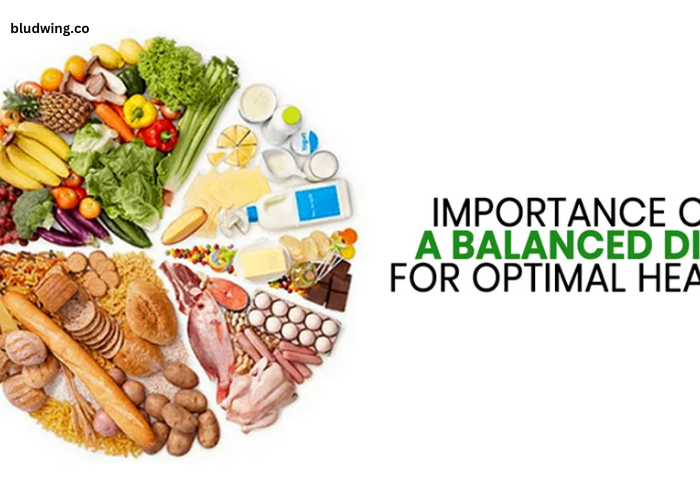When it comes to maintaining a healthy life, nutrition plays an essential role. Balanced nutrition isn’t just about eating fruits and vegetables or cutting out unhealthy foods—it’s about creating a diet that nourishes your body with the right mix of essential nutrients. By focusing on a balanced diet, you give your body the tools it needs to function at its best, supporting physical health, mental clarity, and emotional well-being.
Balanced nutrition provides the foundation for energy, immune system support, and longevity. When you prioritize proper nutrition, you can improve your overall health, manage your weight, reduce the risk of chronic diseases, and enhance mental health. This article will explore how balanced nutrition can benefit your health and wellness, and provide tips on how to build a healthy, well-rounded diet.
Key Points:
- Balanced nutrition provides the necessary nutrients for the body to function properly.
- It plays a crucial role in preventing chronic illnesses and boosting immunity.
- A healthy diet enhances mental health, energy levels, and longevity.
Why Is Balanced Nutrition Important for Your Health?
Balanced nutrition ensures that your body receives a variety of nutrients, including carbohydrates, proteins, fats, vitamins, and minerals, in the right proportions. These nutrients are essential for various bodily functions, from energy production to maintaining healthy tissues and organs.
1. Supports Overall Physical Health
A well-balanced diet helps maintain physical health by providing essential nutrients that support body functions. For example:
- Proteins help repair and build tissues and muscles.
- Carbohydrates are the body’s primary source of energy.
- Fats support brain function and healthy cell development.
- Vitamins and minerals are vital for immune function, bone health, and many metabolic processes.
By ensuring that your diet includes all of these nutrients in proper proportions, you maintain a healthy metabolism, regulate body functions, and ensure that the body operates efficiently.
2. Boosts Immune System Function
Proper nutrition is key to strengthening the immune system. A diet rich in antioxidants, vitamins, and minerals supports the body’s ability to fight off infections and illnesses. For instance, vitamin C (found in citrus fruits and vegetables) and zinc (found in nuts and seeds) are essential for immune health.
Incorporating immune-boosting foods such as leafy greens, berries, and nuts into your daily meals can help protect you from viruses, bacteria, and other pathogens. A strong immune system helps the body recover quickly from illness and reduces the risk of chronic diseases like heart disease and diabetes.
3. Helps Manage Weight
One of the most common benefits of balanced nutrition is weight management. By eating the right foods in the right proportions, you can regulate your weight and avoid both undernourishment and overeating. A diet rich in whole foods—like fruits, vegetables, lean proteins, and healthy fats—promotes satiety and helps control cravings.
For example, fiber-rich foods such as whole grains and vegetables make you feel fuller for longer, which can help prevent overeating. Protein also helps regulate hunger by balancing blood sugar levels and promoting lean muscle mass.
Table 1: Nutrients for Physical Health and Their Functions
| Nutrient | Function | Food Sources |
|---|---|---|
| Carbohydrates | Provide energy for the body | Whole grains, fruits, vegetables |
| Protein | Build and repair tissues and muscles | Lean meats, beans, nuts, tofu |
| Healthy Fats | Support brain function and energy production | Avocados, olive oil, fatty fish |
| Vitamins & Minerals | Boost immune system and overall bodily function | Citrus fruits (Vitamin C), dairy (Vitamin D), spinach (Iron) |
How Does Balanced Nutrition Improve Mental Wellness?
Nutrition isn’t just important for physical health; it also plays a significant role in mental well-being. What you eat affects your brain function, mood, and cognitive performance. A nutrient-rich diet helps reduce feelings of stress, anxiety, and depression, while boosting focus and energy.
1. Enhances Brain Function and Focus
Certain nutrients, such as omega-3 fatty acids and antioxidants, support brain health by improving cognitive function, memory, and mental clarity. Omega-3 fatty acids, found in fatty fish like salmon, nuts, and seeds, are essential for maintaining brain structure and function. Antioxidants from foods like berries, leafy greens, and dark chocolate help protect the brain from oxidative stress and age-related decline.
2. Reduces Stress and Improves Mood
Balanced nutrition helps regulate mood and stress levels. When you provide your body with the right fuel, you can better handle emotional challenges and mental stress. A diet rich in magnesium (found in leafy greens, nuts, and seeds) has been shown to help reduce feelings of anxiety and support a calm, balanced mood.
Additionally, consuming a mix of complex carbohydrates and protein stabilizes blood sugar levels, preventing mood swings and fatigue that often accompany dips in blood sugar.
3. Boosts Energy Levels
Eating a balanced diet ensures that your body has a steady supply of energy throughout the day. By consuming nutrient-dense foods like whole grains, lean proteins, and healthy fats, you provide your body with a steady release of energy rather than the spikes and crashes associated with sugary foods and refined carbs. This sustained energy helps improve focus, productivity, and overall well-being.
Table 2: Nutrients for Mental Health and Their Functions
| Nutrient | Function | Food Sources |
|---|---|---|
| Omega-3 Fatty Acids | Support brain health and cognitive function | Fatty fish (salmon, sardines), flaxseeds |
| Magnesium | Helps reduce stress and improve mood | Spinach, almonds, avocados |
| Antioxidants | Protect brain cells from damage and improve focus | Berries, dark chocolate, green tea |
| Complex Carbohydrates | Stabilize blood sugar and improve energy levels | Whole grains, oats, sweet potatoes |
How Can You Achieve Balanced Nutrition?
Achieving balanced nutrition requires conscious effort, but the results are worth it. Here are some tips to help you create a well-rounded, nutrient-dense diet:
1. Incorporate a Variety of Whole Foods
A balanced diet should include a variety of whole foods, which provide a broad spectrum of essential nutrients. Choose foods from each food group—vegetables, fruits, whole grains, lean proteins, and healthy fats—to ensure you’re getting a diverse range of nutrients. For example, your meals could include roasted vegetables, grilled chicken, quinoa, and a side of avocado.
2. Focus on Portion Control
Even healthy foods can contribute to weight gain if consumed in excess. It’s important to practice portion control to avoid overeating. Pay attention to your body’s hunger and fullness cues, and eat slowly to give your body time to signal when it’s satisfied.
Using smaller plates, serving balanced portions of proteins, vegetables, and whole grains, and being mindful of snack sizes can help you manage your intake.
3. Limit Processed and Sugary Foods
Processed foods, sugary snacks, and refined carbohydrates can disrupt your body’s nutrient balance and negatively affect your health. They often lack essential vitamins and minerals and can lead to weight gain, energy crashes, and inflammation. Instead of reaching for processed snacks, opt for whole-food snacks such as nuts, fruit, or yogurt.
Conclusion: Balanced Nutrition for a Healthier, Happier Life
Balanced nutrition is the key to a healthy and fulfilling life. By prioritizing a variety of whole foods, controlling portion sizes, and focusing on nutrient-dense choices, you can boost your physical health, support mental wellness, and enhance your overall well-being. Nutrition is not just about eating to survive—it’s about fueling your body to thrive.
Remember that small, sustainable changes can make a big difference over time. Start incorporating healthier food choices today, and you’ll feel the positive effects on your health and wellness in the long run.
FAQ’s
1. How do I start practicing balanced nutrition?
Begin by incorporating more whole foods like vegetables, fruits, lean proteins, and healthy fats into your diet while limiting processed and sugary foods. Aim to eat a variety of foods for each meal.
2. Can balanced nutrition improve my mental health?
Yes, a balanced diet can support brain health, reduce stress, and stabilize mood. Nutrients like omega-3 fatty acids, magnesium, and antioxidants play an important role in mental well-being.
3. How can balanced nutrition help with weight management?
Balanced nutrition helps regulate your appetite and prevent overeating. Foods rich in fiber, protein, and healthy fats keep you fuller for longer, making it easier to control your weight.
4. What are some examples of healthy snacks?
Healthy snacks include nuts, seeds, yogurt, fresh fruit, and vegetables with hummus. These options provide essential nutrients without excess sugar or processed ingredients.
5. How much water should I drink for proper nutrition?
Aim to drink at least 8 cups (64 ounces) of water per day. Proper hydration is essential for nutrient absorption, digestion, and overall health.




